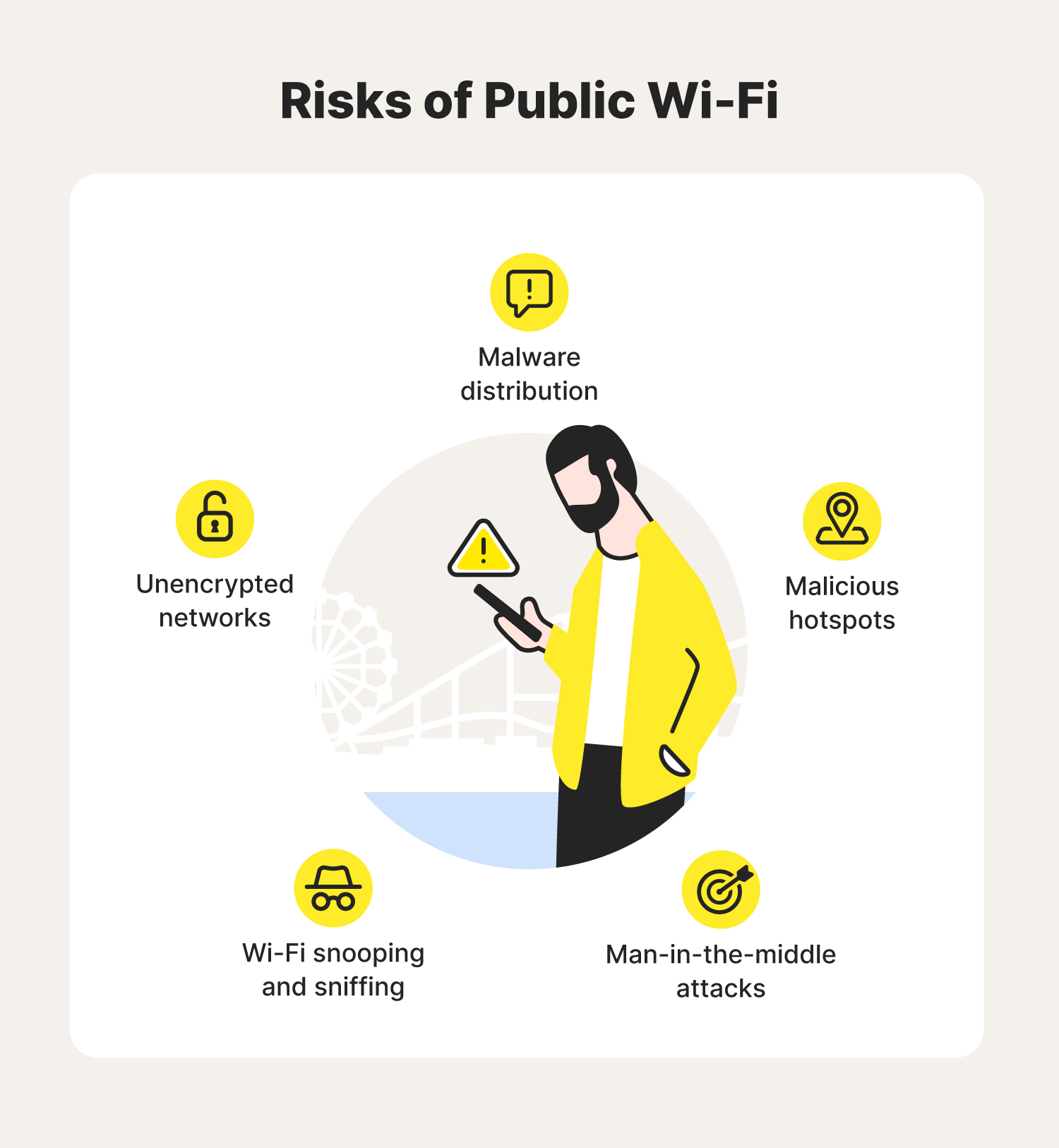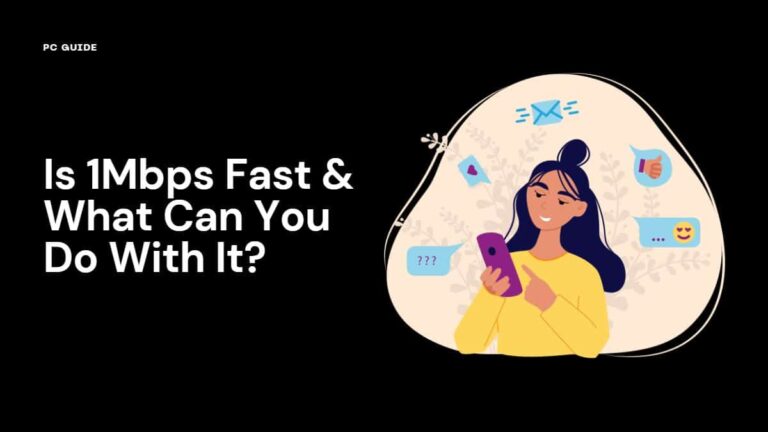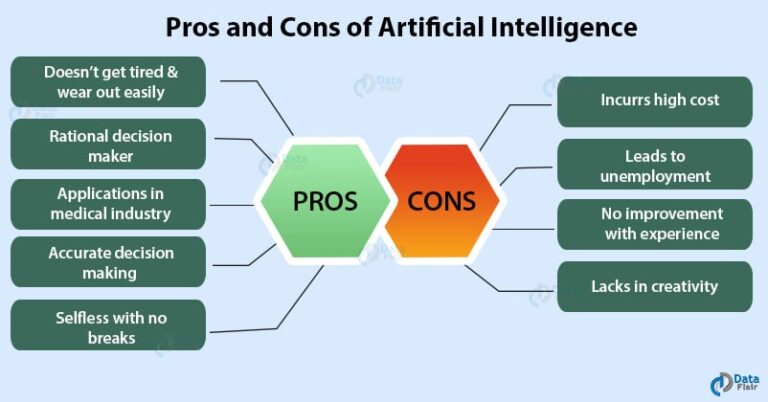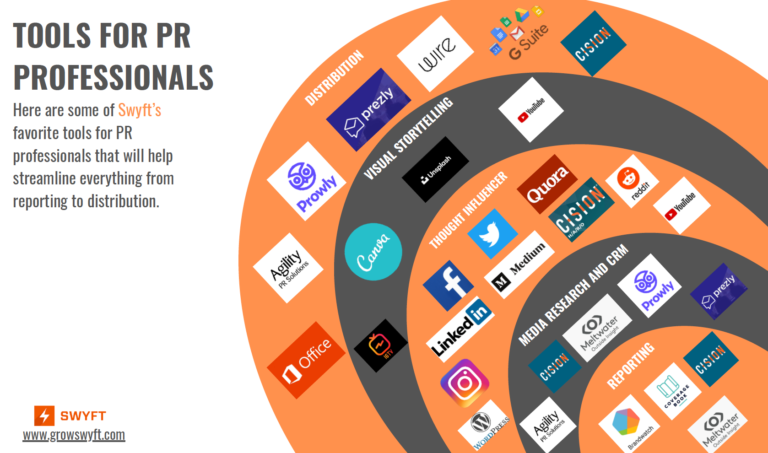Is It Safe To Use Free Wi-Fi?
Using free Wi-Fi can be convenient, but it can also come with some risks. While using public Wi-Fi can make it easy to access the internet on the go, it can also leave you vulnerable to cyber attacks and data theft. It’s important to understand the potential risks that come with using free Wi-Fi and take the necessary steps to protect yourself and your data. With the proper precautions, you can safely use public Wi-Fi networks while minimizing the risk of exposure.
What is Free Wi-Fi?
Free Wi-Fi is a type of wireless internet access which allows people to connect to the web without having to pay for a subscription or service plan. A user simply has to be within range of an open public Wi-Fi network to access it. It is typically found in public places like cafes, airports, or parks, and is often free to use. While the convenience of free Wi-Fi is appealing, it can come with risks. Security concerns abound, as any user can access an open public Wi-Fi network, potentially gaining access to sensitive data. It is important to understand the potential risks associated with free Wi-Fi before connecting to a public network.
Pros and Cons of Free Wi-Fi
The internet has become an integral part of our lives and access to Wi-Fi has become a necessity. But with the convenience of free Wi-Fi comes the risk of security threats. Weighing the pros and cons of free Wi-Fi can help you decide if it’s the right move for you.
On the one hand, free Wi-Fi is convenient and can save you money. It’s a great way to access the internet on the go, especially if you don’t have access to a paid network. Free Wi-Fi can also give you access to content that you wouldn’t otherwise be able to access without a paid subscription.
On the other hand, free Wi-Fi also has a few drawbacks. As it’s not a secure connection, you can’t guarantee that the data you’re sending and receiving is safe. It’s possible that malicious users can access your data and steal information such as passwords and credit card numbers. It’s also possible for hackers to gain access to your device and infect it with malware.
So, is it safe to use free Wi-Fi? Ultimately, the decision is up to you. It’s important to be aware of the risks and take steps to protect yourself. If you’re going to use free Wi-Fi, make sure you’re using a reputable network and take steps to protect your data, such as using a secure VPN and a strong password.
Risks of Using Free Wi-Fi
Connecting to free Wi-Fi can be convenient, but it can also put your device at risk. While it’s tempting to take advantage of free internet access, there are certain risks that come with using public Wi-Fi networks. Hackers can easily gain access to confidential information, such as passwords or credit card numbers, while using unsecured public networks. Additionally, malicious actors can monitor your online activities, such as browsing history, and use that information to steal your identity or access your accounts. They may also be able to inject viruses or malware into your device.
To protect yourself when using free Wi-Fi, it’s important to exercise caution and practice good cyber hygiene. Make sure you only connect to secure networks and avoid connecting to networks that do not have a password. Additionally, be sure to turn off file sharing when connected to public networks, and avoid accessing sensitive sites and applications, such as your banking app. If possible, use a virtual private network (VPN) to encrypt your connection and hide your online activities from hackers. By taking these steps, you can protect your device and your data when using free Wi-Fi.
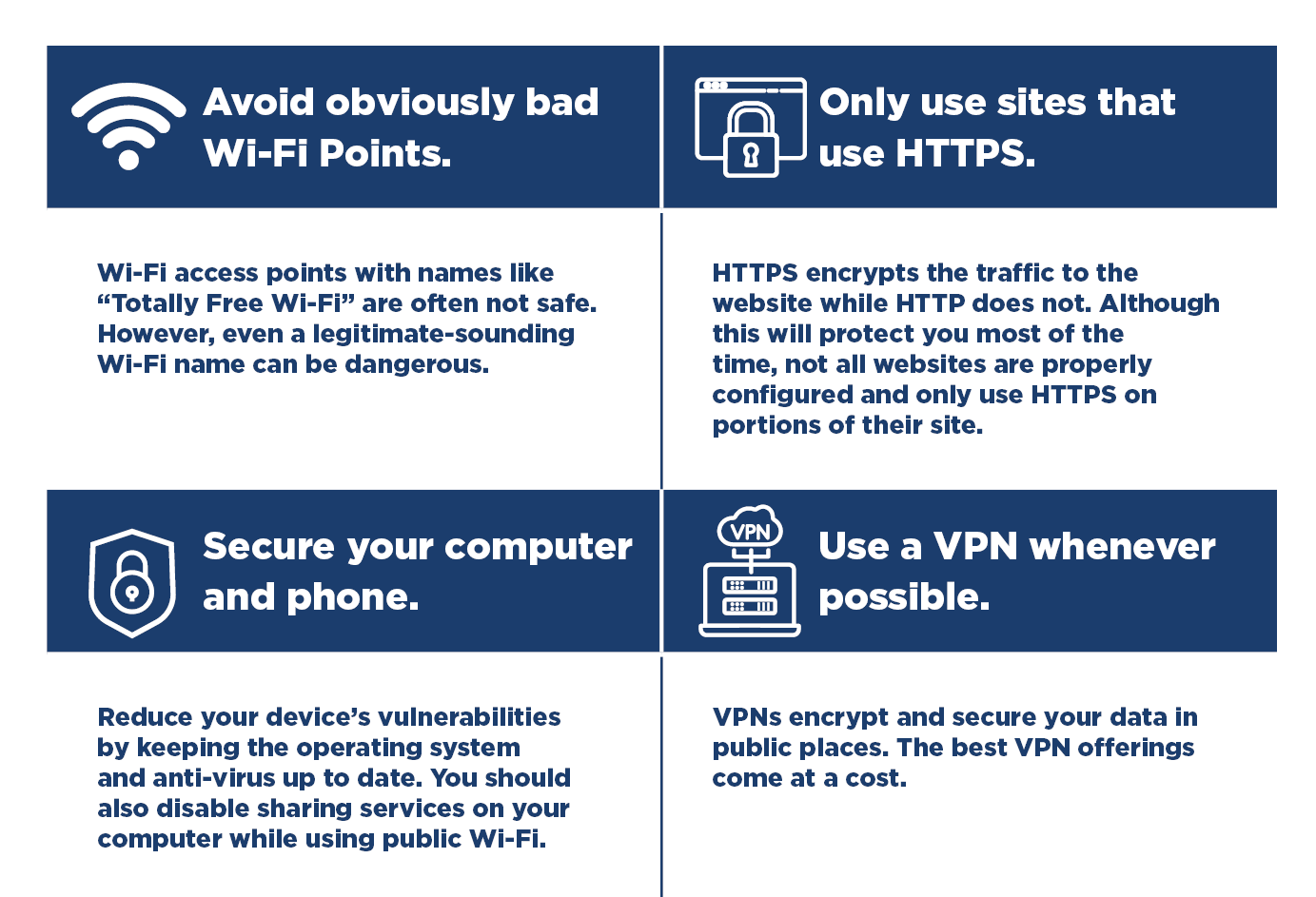
Security Tips for Protecting Your Data on Free Wi-Fi
Networks
Connecting to free Wi-Fi networks is a convenient way to access the internet, but it can also pose potential security risks. Unprotected Wi-Fi networks can leave your data vulnerable to cybercriminals, leaving you at risk for data theft or an attack on your system. To ensure that you stay safe while using public Wi-Fi, it’s important to consider the following security tips:
1. Use a Virtual Private Network (VPN). Using a VPN can help encrypt your connection to the internet, making it more difficult for hackers to intercept your data.
2. Check the Wi-Fi network name. Look for a secure network name or one that includes “https” before connecting.
3. Monitor your activity. Keep an eye on your activity while connected to the Wi-Fi network.
4. Avoid logging into sensitive accounts. Refrain from logging into sensitive accounts, such as banking and credit card accounts, while on public Wi-Fi.
5. Update your software regularly. Regularly updating your software and operating system can help protect your system from potential threats.
By following these simple tips, you can help protect your data while using public Wi-Fi networks. Keep in mind that while free Wi-Fi can be a convenient way to access the internet, it can also pose significant security risks. Consider these tips to ensure that your data remains safe and secure.
How to Identify a Secure Wi-Fi Network
?
Wi-Fi has become an increasingly popular way to connect to the internet. We often find ourselves in situations where we need to access the internet but don’t have access to our own private network. This is when free public Wi-Fi networks come in handy, but is it safe to use them? It is important to understand how to identify a secure Wi-Fi network to ensure that your data is safe and secure when accessing the internet.
One of the most important things to look out for when identifying a secure Wi-Fi network is the type of encryption used. WPA2 encryption is the most secure form of encryption used for Wi-Fi networks, and should always be used if available. Other forms of encryption such as WEP are less secure and should be avoided.
Another important thing to look out for is the name of the Wi-Fi network. Networks with names like “free public Wi-Fi” should be avoided as they may not be secure. Additionally, it is important to be aware of any networks with names that may indicate they are legitimate networks, such as those with the name of a business or the name of the network provider.
Finally, it is important to ensure that the Wi-Fi network you are connecting to is in a secure location. This means that the network should be in a well-lit area and should not be located in an area that is easily accessible to the public. Additionally, it is important to be aware of any suspicious activity on the network or any requests for personal information.
By following these tips, you can ensure that the Wi-Fi network you are connecting to is secure and that your data is safe and secure. Always remember to stay vigilant and stay safe when accessing the internet.
Alternatives to Free Wi-Fi
Free Wi-Fi may be convenient, but it isn’t always safe. There are several alternatives to free Wi-Fi that can help protect your data and your privacy. One alternative is to use a private mobile hotspot. This allows you to create your own secure Wi-Fi network, giving you control over who can access it. This can be used on the go, so you’re not limited to one location. You can also use a Virtual Private Network (VPN). This will encrypt your data, making it much harder for hackers to access. Additionally, many public Wi-Fi networks offer secure options. Before connecting, look for a lock icon or “https” in the URL. This will let you know the connection is secure. Finally, you can use your cellular data plan. Many cellular plans offer unlimited data, so you can use your phone’s data connection without worrying about data caps. Using one of these alternatives can help keep your data secure, so you can enjoy the convenience of Wi-Fi without sacrificing your security.
FAQs About the Is It Safe To Use Free Wi-Fi?
1. Is free Wi-Fi secure?
No, free Wi-Fi is not secure. Open networks are easily accessible to anyone, and any data or information you transmit over an open network is not encrypted, leaving it vulnerable to interception from malicious actors.
2. Is it safe to send personal information over free Wi-Fi?
No, it is not safe to send personal information over free Wi-Fi. Any data sent over an open network is not encrypted, and can be intercepted by malicious actors.
3. What can I do to protect myself when using free Wi-Fi?
When using free Wi-Fi, you should always use a VPN to encrypt your data and protect your privacy. Additionally, you should avoid accessing any sensitive information or websites when using public Wi-Fi.
Conclusion
In conclusion, using free Wi-Fi can be a convenient way to stay connected, but it is important to remember that it is not always safe. It is important to take steps to protect yourself when using free Wi-Fi, such as using strong passwords, avoiding public networks, and using a VPN. Taking these steps can help protect your personal information and help ensure a safe and secure experience when using free Wi-Fi.
